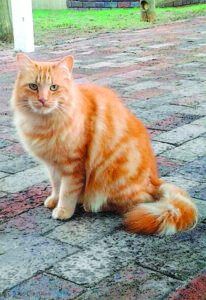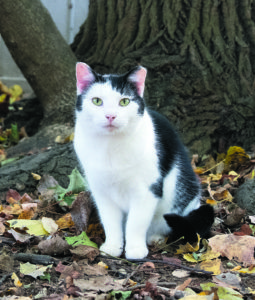All over the world, community cats have made a collection of college campuses their homeand professors, students, and volunteers have responded by carrying out Trap-Neuter-Return (TNR) and caring for them.
TNR stabilizes campus cat populations, reduces university costs, improves the cats’ health, and mitigates the public’s concern about the cats, according to a nine-year study of the Campus Cats NSW program at the University of New South Wales in Sydney, Australia.
Among the programs that used Alley Cat Allies’ resources:
University of Panama
Nonprofit Spay Panama helped set up a TNR program the University of Panama after authorities started poisoning the cats two years ago. The group met with the university and its community members and came up with a new policy: Students and professors would carry out TNR, and Spay Panama would do the spay and neuter surgeries. So far more that 300 cats have gone through the program. Now, they’re living healthier lives on the campus, says Spay Panama founder and director Patricia Chan. She says Spay Panama regularly monitors the colonies to ensure that any new cats are also spayed or neutered.
University of the Western Cape, Cape Town, South Africa

Gatto lives on the university of the Western Cape campus in South Africa and is part of the TUFCAT program.
After university lecturer Sharyn Spicer saw dozens of cats on campus on her first day of work in 1995, she wanted to help them. A year later, she started TUFCAT, along with the late university operations manager Andre Oppelt. More than 400 cats lived on campus when TUFCATa member of the Alley Cat Allies Feral Friends Networkstarted. Thanks to TNR, today only about 100 cats remain. TNR has prevented more litters from being born and allowed the population to naturally decrease.
Spicer used to do all the feeding, but now employs a full-time staff member who feeds, traps, cares for the cats, and sells secondhand books to students to raise money for the project. Faculty volunteers also help care for the cats. The university contributes a small monthly fee to TUFCAT. The rest is funded by donations.
University of West Florida, United States
The University of West Florida Campus Cat Program started in 2017 after faculty member Karen Smith voiced concerns over a policy that allowed community cats to be removed from campus, which is on a 1,600-acre nature preserve. It took months of review, but the university embraced the Campus Cat Program. About 60 percent of the cats on campus have been spayed or neutered so far, says Smith.
A major component of the program has been to educate the campus about community cats and the TNR program, says Smith. Nine staff volunteers coordinate feeding the 22 campus cats every day. A local animal protection organization trained Smith and another university staff member to carry out TNR.
“There’s tremendous support for the program,” Smith says. “I think the cats have an enduring home here.”
Arizona State University-Tempe, United States
Arizona State University-Tempe has created a stable, healthy population of about 60 campus cats since a group of caregivers banded together in 2002. The success of the Mildcats program has changed the attitudes of university leadership.
“On the Tempe campus, they now help us and come to us when they have an issue,” says Karen Adams, who is a program volunteer and university professor. “They see our success, and [we think that] intensive trapping and neutering won them over. They have even asked us to help with growing programs on other ASU campuses.”
The program consists of about seven volunteers, who fund the program out of their own pockets and also hold fundraisers.
National University of Singapore (NUS)
The NUS Cat Café programwhich is a TNR programwas started in 2009 to care for cats on campus and also to address any campus members’ concerns about the cats. It used the model of another university in Singapore.
The program has 30 student and staff volunteers who help care for nine campus cats, all of whom are spayed or neutered. The program is funded through donations and fundraising events. The university supports the program, and lets it use event space and hang up flyers.
“I would say that Singaporeans are generally loving towards the community cats around us,” says Bob Gan, project director of the organization. “It is common to see residents taking care of the community cats in the different residential areas. Some people love to go up to play with and pet the cats when they walk past them.”



